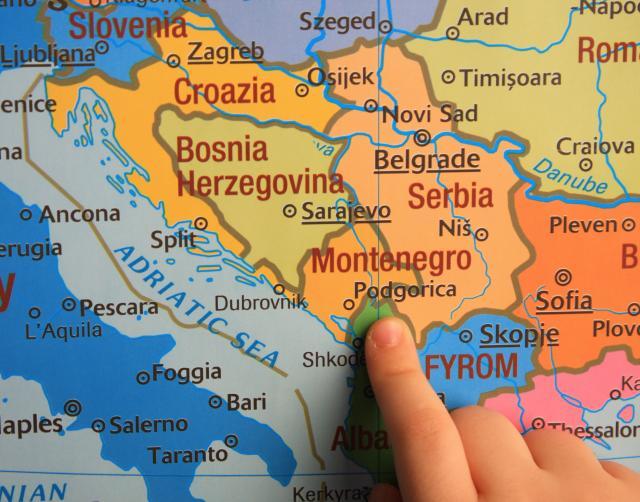Today, the world faces dynamic changes. Contemporary world encounters the security challenges which have manifested in a wider spectrum and have become completely unpredictable. Therefore, it is right to say that, today, the world is not at the end of history, but it is at the great historical turning point. This, of course, inevitably strongly reflects on the political and security situation at the Western Balkans.
Whenever we look back into the past of this region, we see the consequences of war trauma and conflicts that took place and we create a picture with no perspective to lead a peaceful life here. In order to better understand the contemporary and predict the future security risks, one should recall one still actual statement of the famous British Prime Minister Winston Churchill: “The farther back you can look, the farther forward you are likely to see.”
It can be said that almost every state in the Western Balkans has a problem with its own past, present and future, primarily because they see the European and world trends in a different way following them from the perspective of their public political field. There should also be added the challenges of the implementation of modern democratic standards, serious problems with the preservation of budget and fiscal stability, large public debts and distorted economic ties with neighbors in the region. Open and
unresolved border issues are a particular challenge which the EU has set as a condition for each of the Western Balkans country to become its member. However, no matter how all this seem discouraging, it does not provide enough ground to think that by the internal forces alone, a military conflict with one of the neighboring countries could be re-launched and which could have as a consequence the ethnic cleansing and great war destructions. However, if it is so today, it does not mean that it will remain so forever. It is the Balkans‘ fate, and it has been historically confirmed that only the uncertainty and unpredictability of the development of negative events are sure. “We have not yet demolished the bridge that connects us with the catastrophic past; it is still possible to fall backwards. The Balkans is still full of devastating potentials “(Z. Đinđić, 2003).
There are numerous examples of interests that major global actors show for this region, wanting to gain influence and dominance. This has always been strongly expressed historically. Today’s degree of their interest convinces us that only the integration of all Western Balkans countries into the wider Euro-Atlantic political and security structures can ensure the lasting political stability and faster economic development. At the same time, the interdependence and significance of cooperation among the states in the
Western Balkans region and the need to point out the necessity of a greater degree of its inter-regional cohesion should not be ignored. All of today’s global security challenges, risks and threats, without the rest, are present in this region. The response can be effective and comprehensive only if it is synchronized regionally and based on the highest level of mutual trust.
The continuity of the existing risks and threats to the stability of the region, with the current major security challenges (great refugee crisis, the threat of terrorism, undefined status and border issues of individual entities, etc.) make this area still susceptible to various negative influences, which, as a consequence, can have, or already have, the elements of instability. Different strategic goals and foreign political priorities of the countries in the region make difficult the already underdeveloped regional cooperation,
and thus the efficient progress towards broader political and security integrations.
The refugee crisis, terrorism, continuously expressed ethnic and religious intolerance and strong influence of the big ones outside the region, have strong recedives that can make the West Balkans unstable again if it is not integrated faster into the Euro-Atlantic structures. Existing crisis in the world motivate a respectable number of interested fighters from this region to participate in them. Their coming back home represents a dangerous security challenge which cannot be successfully confronted unless a good
inter-institutional regional cooperation is achieved.
Taking into account the national security systems of the Western Balkans states, it is noted that their internal character is determined by the geopolitical framework in which some of them have found or prefer to find themselves. Heterogeneity in strategic determinations is observed, starting from the clear perspective of membership in the wider integration units, up to a model that aims at achieving a regional and wider autonomy without belonging to any political and security alliance. Apart from the recent
wartime past there are some other elements that contribute to such a situation: the formed negative perception of the region existing in some countries, as well as the fact that their societies are demographically complex entities in which faith and nation are cohabiting. The threshold of tolerance for mutual life is not yet at the satisfactory level and represents a potential threat of escalation of some form of asymmetric conflict. In case of possible unpredictable events in these countries, the regulatory mechanisms of internal control and response capacities are still insufficient and therefore a political and security framework that would guarantee a greater degree of security is required.
The concept of neutrality, often recommended by certain external powerful centers as optimal for the Western Balkans, can certainly be a way for the countries having such a status to eliminate security risks. However, in the Western Balkans, the affirmation of the concept of neutrality is nothing more than a synonym for a certain potential division on the side of those global and regional entities that are in opposition to the Euro-Atlantic integration frameworks with a latent threat of compromising the sovereignty and statehood of especially small countries in the region. For these reasons, this concept cannot in any way be a guarantee of the regional peace and stability.
The Western Balkans has historically confirmed that is one of Europe’s most vulnerable regions prone to violent primitive conflicts which have often turned into the destructive wars as a consequence of the regional “security vacuum”. During this period, all Western Balkans countries were out of the key integration flows in Europe and the world. NATO, as the strongest defense alliance in the Euro-Atlantic area, referred to the countries of this
region as the sources of instability and conflicts on the borders of the Alliance, given that no country in the region was a NATO member at that time. Also, the EU was then “an external actor” in this area, without the member states from the Western Balkans. It was a time when the countries of the region were left to themselves to solve their own problems
in a situation where there was no security framework that would interconnect them and would be a potential catalyst of the conflicts and disagreements.
Europe and the world face an extremely unpredictable development of security opportunities on a daily basis, and this, directly or indirectly, leave a negative mark even on the Western Balkans region, which, with its still fragile stability, in turn, adds up to a great extent a complex European political and security situation. This is additionally augmented by the uncertainty of the Western Balkans countries about their prospects for
the EU membership which is increasingly complicated and became particularly evident in the case of the UK referendum on exit.
In Europe today, there are many open questions with a high degree of inability to create the right answer, and they point to the need for the rapid structural changes in the architecture of the EU. Challenges of BREXIT and a widespread dissatisfaction with the economic situation and democratic deficit in the European institutions are the dominant topics that the EU will have to address in near future if it wants to preserve its structure.
In this context, it is very important that the traditionally conflicting European regions are not neglected again, and the need for an urgent and comprehensive inclusion of these areas in a single European space should be recognized in particular. Europe cannot be late this time to undertake the necessary actions because the consequences could be even more tragic than these ones at the end of the last century.
Neither there should be any dilemma about whether Europe must finally turn to the whole of its area, in particular to those parts that are associated with the eternal historical instability. This requires a much higher degree of European determination and efficiency,
which has not been its stronger side so far, especially not in the recent past, when the dramatic events, caused by the disintegration of the SFRY, shook not only the region of the Western Balkans but also whole Europe. Europe need to overcome a state of paralyzing fear. Its members need to bring decisions faster and become prepared to observe the continent as a single space. The sense of economic partnership among its big members will turn to political and security challenges which may have detrimental effects
on its economic cohesion. In such circumstances, there is, in particular, a danger regarding the Western Balkans, if the incompleted European space continue to exist more as a geographical term than as the European political and economic communion. This will make this historically easily vulnerable area even more fragile and at some point it will negatively influence the more developed part of Europe.
Author: Boro Vučinić, Ambassador of Montenegro in Zagreb and a member of Advisory Board at the CfSP

